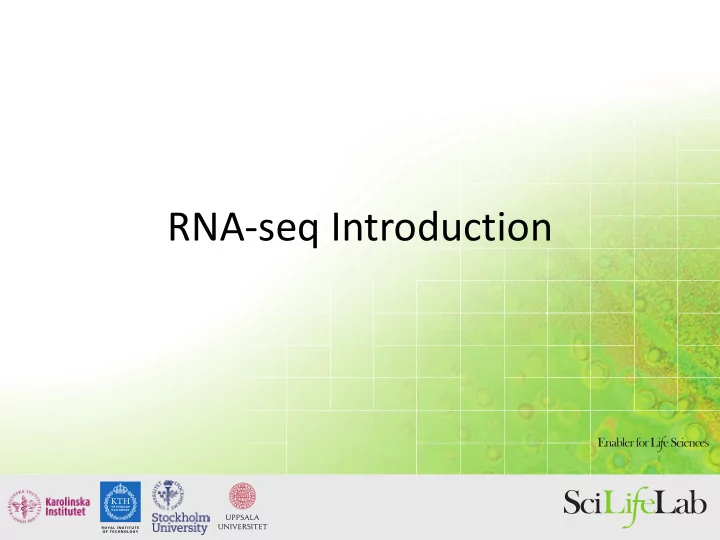

RNA-seq Introduction
DNA is the same in all cells but which RNAs that is present is different in all cells
There is a wide variety of different functional RNAs
Which RNAs (and sometimes then translated to proteins) varies between samples -Tissues -Cell types -Cell states -Individuals -Cells
RNA gives information on which genes that are expressed How DNA get transcribed to RNA (and sometimes then translated to proteins) varies between e. g. -Tissues -Cell types -Cell states -Individuals
ENCODE, the Encyclopedia of DNA Elements, is a project funded by the National Human Genome Research Institute to identify all regions of transcription, transcription factor association, chromatin structure and histone modification in the human genome sequence.
ENCyclopedia Of Dna Elements
Different kind of RNAs have different expression values Landscape of transcription in human cells, S Djebali et al. Nature 2012
What defines RNA depends on how you look at it Coverage Variants Abundance House keeping RNAs mRNAs Regulatory RNAs Novel intergenic None Adapted from Landscape of transcription in human cells, S Djebali et al. Nature 2012
Defining functional DNA elements in the human genome Statement Consequence • • – A priori , we should not expect the – Thus, one should have high transcriptome to consist exclusively confidence that the subset of the of functional RNAs. genome with large signals for RNA or chromatin signatures coupled Why is that • with strong conservation is – Zero tolerance for errant functional and will be supported by transcripts would come at high cost appropriate genetic tests. in the proofreading machinery – In contrast, the larger proportion needed to perfectly gate RNA of genome with reproducible but polymerase and splicing activities, low biochemical signal strength or to instantly eliminate spurious and less evolutionary conservation transcripts. is challenging to parse between – In general, sequences encoding specific functions and biological RNAs transcribed by noisy noise. transcriptional machinery are expected to be less constrained, which is consistent with data shown here for very low abundance RNA
Biochemical evidence not enough to identify functional RNAs Defining functional DNA elements in the human genome Kellis M et al. PNAS 2014;111:6131-6138
• RNA seq course
One gene many different mRNAs
How are RNA-seq data generated? Sampling process
Depending on the different steps you will get different results RNA-> PolyA (mRNA) AAAAAAAA RiboMinus (- rRNA) enrichments -> Size <50 nt (miRNA ) ….. Size of fragment Strand specific 5’ end specific 3’ end specific ….. library -> reads -> Single end (1 read per fragment) Paired end (2 reads per fragment)
The RNA seq course • From RNA seq to reads (Introduction) • Mapping reads programs (Monday) • Transcriptome reconstruction using reference (Monday) • Transcriptome reconstruction without reference (Monday) • QC analysis (Tuesday) • Differential expression analysis (Tuesday) • Gene set analysis (Tuesday) • Multi Variate Analysis (Wednesday) • miRNA analysis (Wednesday)
Promises and pitfalls Long reads short reads High throughput (+) • Low throughput (-) • • Fractions of transcripts (-) Complete transcripts (+) • • Full dynamic range (+-) Only highly expressed • Unlimited dynamic range (+) • genes (--) Cheap (+) • • Expensive (-) Low background noise (+) • Low background noise (+) • • Strand specificity (+) Easy downstream analysis • • Re-sequencing (+) (+) 10000 1000 Signal EST 100 MicroArray 10 RNAseq 1 1 10 100 1000 10000 100000 1000000 # trancripts/cell
RNA seq reads correspond directly to abundance of RNAs in the sample
Map reads to reference
Transcriptome assembly using reference
Transcriptome assembly without reference
Quality control -samples might not be what you think they are • Experiments go wrong – 30 samples with 5 steps from samples to reads has 150 potential steps for errors – Error rate 1/100 with 5 steps suggest that one of every 20 samples the reads does not represent the sample • Mixing samples – 30 samples with 5 steps from samples to reads has ~24M potential mix ups of samples – Error rate 1/ 100 with 5 steps suggest that one of every 20 sample is mislabeled • Combine the two steps and approximately one of every 10 samples are wrong
RNA QC Read quality Mapping statistics Transcript quality Compare between samples
Differential expression analysis using univariate analysis Typically univariate analysis (one gene at a time) – even though we know that genes are not independent
Gene set analysis and data integration �
microRNA analysis (Berezikov et al. Genome Research, 2011.)
All the steps will affect the results All RNA
All the steps will affect the results Experimental setup All R A
All the steps will affect the results Lab work + RNA extraction Expeimental setu All R A
All the steps will affect the results RNA enrichment protocoll Expeimental setu All R A
All the steps will affect the results Sequencing machine Expeimental setu All R A
All the steps will affect the results Reference Expeimental setu All R A
All the steps will affect the results Mapping program Expeimental setu All R A
All the steps will affect the results Differential expression analysis program Expeimental setu All R A
Try to be as consistent as possible Differential Differential expression expression analysis program analysis program Expeimental setu Expeimental setu All R A All R A Differential Differential expression expression analysis program Expeimental setu analysis program Expeimental setu All R A All R A
Recommend
More recommend